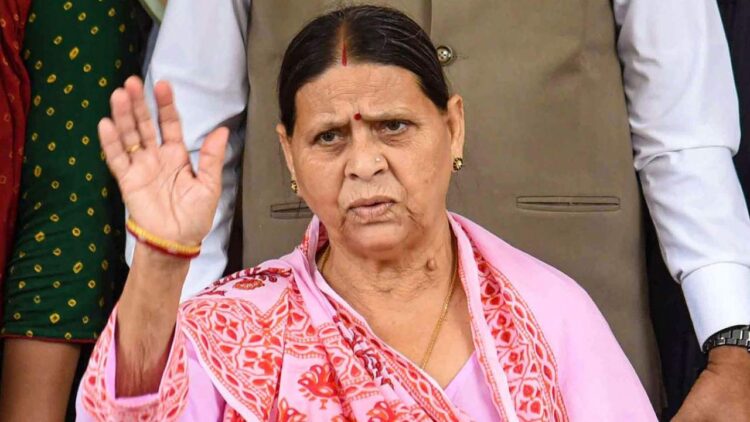Bihar First Female CM Rabri Devi History: There was a time in the streets of Patna when politics was considered only the legacy of men. But on 25 July 1997, something happened that surprised the entire country, not only Bihar. After Lalu Yadav went to jail, the power of Bihar suddenly came into the hands of a woman who had neither experience of politics nor habit of speaking from the stage. But she went to create women’s history. Her name was Rabri Devi. This ordinary housewife gradually became an extraordinary political face to become the first woman Chief Minister of Bihar. Let’s know who is Rabri Devi? Where did he study, what is their family and political background? How did the Chief Minister and what decisions he took which are still a matter of discussion in Bihar politics.
Travel from housewife to Chief Minister
Rabri Devi was born in 1956 in Siswa village of Gopalganj district of Bihar. His family was a traditional Bhumihar Brahmin. The education of Rabri Devi, who grew up in a very simple environment, could not be ahead of the tenth grade. He got married to Lalu Prasad Yadav at an early age, who was active in student politics at that time. After marriage, Rabri Devi became completely in family life. He gave birth to 9 children – 2 sons and 7 daughters. Lalu Yadav was in spate in politics and Rabri Devi was handling her home. He never wanted to come into public life. But luck had something else approved.
When Lalu went to jail and Rabri became Chief Minister
Lalu Yadav had become the most powerful leader of Bihar in the 1990s. But the revelations of the fodder scam in 1997 put him in crisis. When he had to go to jail, there was political earthquake in Bihar. The leaders of the Janata Dal (which later became the Rashtriya Janata Dal) were in the can who would become the next Chief Minister. The decision taken by Lalu Yadav shocked the entire country – he made his wife Rabri Devi the Chief Minister’s post. On 25 July 1997, Rabri Devi was sworn in as Chief Minister, and with this she became the first woman Chief Minister of Bihar.
‘Rubber stamp’ or clever politician?
When Rabri Devi became the Chief Minister, political opponents called her “rubber stamp CM”. His argument was that the real power is in the hands of Lalu Yadav and Rabri is only a mask. But gradually Rabri Devi started making her mark. He reshuffled the bureaucracy, launched plans for Dalits and backward classes, and many such decisions which also approve their intentions, not only in his name. Between 1997 and 2005, she became the Chief Minister three times that the public also accepted her as an independent leader, not only ‘Lalu’s wife’.
Political heritage and family strength
The family of Rabri Devi and Lalu Yadav is considered to be the largest political family in Bihar politics. His son Tejashwi Yadav is the deputy CM of Bihar today and considers himself the next Chief Minister. Daughter Misa Bharti is a Rajya Sabha MP. Tej Pratap Yadav is also active in politics. Rabri Devi’s family is now called the “Gandhi-Nehru family of Bihar”-where politics flows into the blood. Rabri Devi herself has also been a member of the Legislative Council and is considered a senior leader of the party. His opinion is taken seriously in Tejashwi’s decisions.
Fodder scam and Lalu’s jail visit
In 1996, when the fodder scam of ₹ 950 crore was exposed, Lalu Prasad Yadav faced serious allegations. In the scam, money was withdrawn from the government treasury through fake bills. When the CBI registered a case against Lalu, the case became serious. He eventually had to go to jail in 1997. This was the same time when Rabri Devi was made CM. In this entire incident, Rabri Devi stood firmly in her husband’s favor. He saved the party from disintegrating and kept himself in power.
Big decisions as Chief Minister
Rabri Devi took many such decisions during her Chief Minister’s tenure, which remained in the discussion:
1. Emphasis on women empowerment: They promoted girl education, increased facilities for girls in schools.
2. Drink upliftment schemes: Government schemes for backward and downtrodden implemented more effectively.
3. Bihar Police Reform: Women’s Help Desk was introduced in crime control and police stations.
4. Firm Rajya system strengthened: Reservation was increased in panchayats for women.
Protests and criticisms
The reign of Rabri Devi was also promoted as “Jungle Raj”, especially the BJP and JDU questioned their leadership. Issues like increasing crime, kidnapping industry, and unemployment in Bihar became major criticisms of their rule. But supporters believe that the foundation of social justice was laid under his rule.
The image of Rabri Devi today: ‘Mother’ status in politics
Today, Rabri Devi may not be as vocal in active politics, but she is seen as “maternal power” in the Rashtriya Janata Dal. His role in Tejashwi Yadav’s strategies is important. She publicly speaks less, but her opinion in the party’s internal politics is considered decisive. His simplicity, clean image and strong family relationships still connect him to the public. They are among the few women who found such a high height without any political background in modern politics.
Rabri Devi is an example
The story of Rabri Devi is the story of a woman who suddenly came into politics and shocked everyone. He taught that the leadership not only comes from education or experience, but also comes from self -power, patience and ability to fight situations. Her becoming the Chief Minister was not just a political move, she was a social revolution when a housewife proved that women could handle power, and firmly handle. Rabri Devi is not a name, but an example of female leadership, courage and family values in Indian politics.








